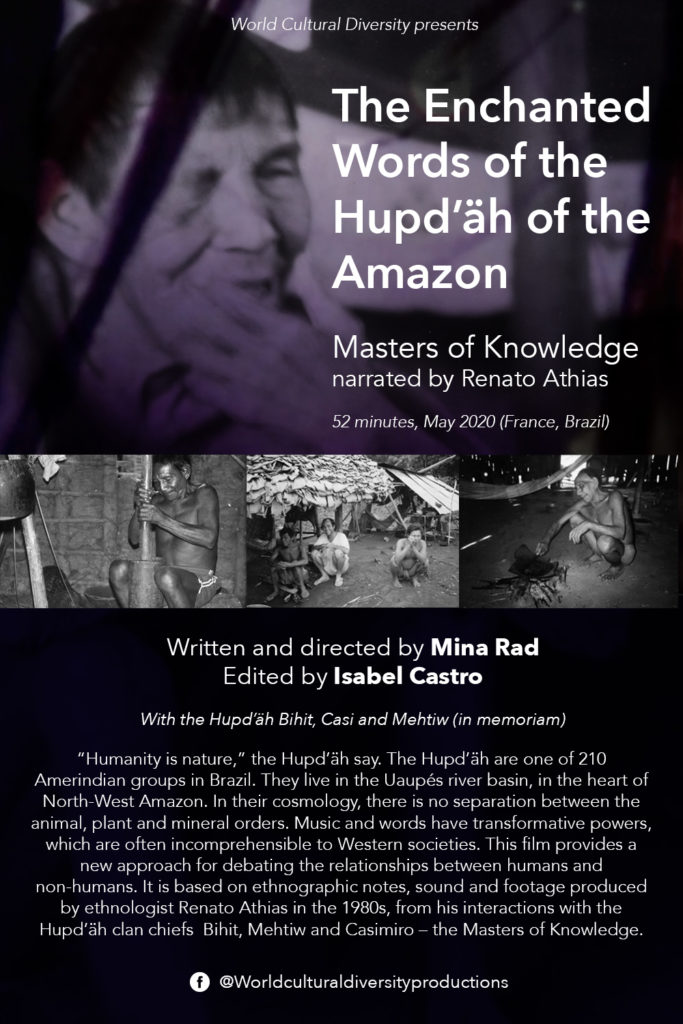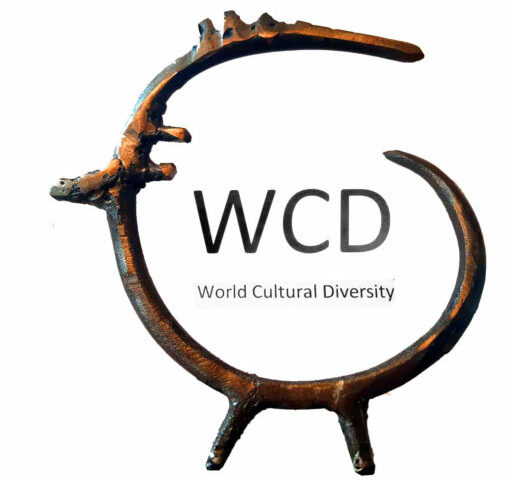The Enchanted Words of the Hupd’äh of the Amazon – Masters of knowledge, narrated by Renato Athias
A film written and directed by Mina Rad edited by Isabel Castro, World Cultural Diversity, 2021, France , Brazil,( short version in 30′)
The Hupd’äh are one of 210 Amerindian groups in Brazil who live in the Uaupés river basin, in the heart of North-West Amazon. They believe that humanity is nature. This film provides an approach for debating the relationships between humans and non-humans. In the cosmology of Hupd’äh, there is no separation between the animal, plant and mineral orders. Music and words have transformative powers, which are often incomprehensible to Western societies. Bihit, Mehtiw and Casimiro – Hupd’äh clan chiefs and the Masters of Knowledge – are important figures in this film, which is based on ethnographic notes, sound and footage produced by anthropologist Renato Athias. “The Enchanted Words of the Hupd’äh of the Amazon” is a film that highlights what the Hupd’äh people have to say to Western societies.
This film was completed during this pandemic period and is about the traditional knowledge of the Hupdah people based on the narratives of three clan chiefs Bihit, Casimiro and Mehtiw through the ethnographic archives collected by the anthropologist Renato Athias. This knowledge presented in the film does help to think about human and non-human relationships in the current context of our societies.

https://www.facebook.com/TheenchantedwordsofHupdahoftheamazon
Rai film festival :
Dear friends, we are always confined around the world. Our film “The Enchanted Words of the Amazon Hupd’äh – Masters of Knowledge” travels in different colloque and festivals. It had traveled to The Para Ethnographic film festival (Brazil), to Sacred song festival (Holland), IUAES (Croatia)
It will be tomorrow at RAI Film Festival , a traditional film festival promoted by the Royal Institute of Anthropology of Great Britain and Ireland (RAI) tomorrow …if you are at RAI we will be happy to see you in the panel 25
Mina Rad CEO of Word Cultural Diversity (WCD) and Professor Renato Athias, from the Department of Anthropology and Museology and coordinator of the Visual Anthropology Laboratory (LAV)), both from the Federal University of Pernambuco, who are participating in the RAI Film Festival , a traditional film festival promoted by the Royal Institute of Anthropology of Great Britain and Ireland (RAI).
This Wednesday, 24 th of march at 14h ( UK), 15h ( France) , 11h ( Brazil), Mina Rad and Athias will be in the debate proposed in the film “The Enchanted Words of the Amazon Hupd’äh – Masters of Knowledge”, whose narration is yours, which is inserted in panel 25: “Between Academic Theory – Building and Social Engagement: Discussing Creative Workshops and Participatory Video Making””.
The debate, according to Professor Athias, will address a collaborative project between an anthropologist, a filmmaker and a specialist in archives for a documentary about an endangered indigenous group in the Brazilian Amazon. « Particular attention was paid to ethnographic information, cosmological narratives and traditional knowledge, » he says.The film “The Enchanted Words of the Amazon Hupd’äh – Masters of Knowledge narrated by Renato Athias” was released in 2020 in Paris, produced by the Franco-Iranian director Mina Rad of the producer “World Cultural Diversity” in partnership with the Laboratory of Visual Anthropology (LAV) of PPGA / UFPE, using ethnographic archives, films, photographs, field notebooks, which are now digitized by the University of Texas at the Latin American Indigenous Language Archives, AILLA (Austin campus). https://www.facebook.com/Worldculturaldiversityproductions/photos/a.2025424227699448/2879625458945983/
Scared song festival , Holland , 2020 :
Presentation of zoom in english 13th of july 2020 : « The Enchanted Words of the Hupd’äh of the Amazon – Masters of knowledge, narrated by Renato Athias »13th july 2020
Your words around the world about the film :
« The film is very interesting and good to watch. I especially liked the chaining of the three looks that the film brings together: that of the director who is enchanted by a universe that is distant from her; that of the anthropologist’s source of his field experience, done in French for her; and that of the film / ethnographic record made on the spot itself. Congratulations on the movie!«
Hebe Mattos (Historienne, UFJF/UFF, Brésil)
« The film deals with Hupdah cosmology through film images, photographs and conversations with anthropologist Renato Athias, from UFPE, configuring itself, in this way, as a beautiful tribute to a man who dedicated more than 50 years of studies and activism to this people. At the beginning, and also at the end, the director, of Persian origin, attests to the intercultural encounter between the Persians’ epistemologies / ontologies (cosmologies?) And the one she sought to understand from the Hupdah, affirming both millennials and based on a philosophy of the environment centered valuing the essential elements of life. The plot unfolds in conversations with the anthropologist who, in Brazil, presents the region of the Upper Rio Negro, particularly in a meeting between rivers, where are the 35 villages of this people. After that moment, those who watch are taken to a garden in France, where the conversation takes place in which Renato takes over the three masters of his thinking, a position that was given to him by the anthropologist for having taught the basis of what he knows about that people. At that moment in the French garden, categories of this people, such as the meaning of the name of the people – people – and how Renato himself is called by them – foam from the river – are presented in the middle with ritual situations of Hupdah life. The thread of the conversation is the presentation of the three masters – Bihit, Mehtiu and Casimiro and how important they were to Renato, but in addition, through the relationship between the anthropologist and each of the masters, we entered more deeply into the Hupdah way of life. The strongest scene in the film, described by Renato, is the death of his master in 1994. The meeting between Renato’s willingness to offer help and the preparation of the funeral rite of the specialist who was dying (with his participation) is evident . The scene brought me to tears. The film is, therefore, an excellent audiovisual contribution to the field of ethnography, resuming through the trajectory of one of the most important Brazilian ethnologists engaged in the need to defend the memory of peoples who, as we see at the conclusion of the film, are in the process of transformation, in this case, by the impact of neo-Pentecostal missionaries in the region. »
Prof. Dr. Felipe Bruno Martins Fernandes( Brésil ) :
Grupo de Estudos Feministas em Política e Educação (GIRA)/ Bacharelado de Estudos em Gênero e Diversidade (BEGD)..
